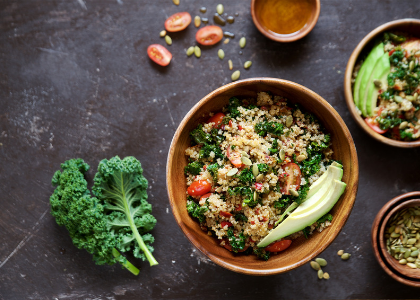
8 Essential Ingredients for a Plant-Based Kitchen
By Suzanne Boothby
A well-stocked kitchen makes it easier than ever to put a meal together quickly. When you are transitioning to a whole-food plant-based diet, you might need to try some new ingredients and have them on-hand. For example, if you are no longer eating eggs, a chia seed can be a great substitute for baking.
Here are a few essentials to fill out your kitchen and make your meals even more delicious and nutritious.
1. Apple Cider Vinegar
Often called ACV by those who love it, this vinegar is a great staple for any home. It helps regulate blood sugar, aids in weight loss, improves digestion, can help fight allergies and more. This fermented product is made from fresh apples. You can use it in salad dressings, mixed into your juices, add it to sparkling water for flavor or just take a shot of it in the morning. Use it in any recipe that calls for lemon or lime, as well.
2. Chia seeds
Not only are these little seeds a powerhouse of nutrition packed with omega-3 fatty acids, protein, and fiber, but they also make a great egg substitute. Try mixing 1 tablespoon of chia seeds with about 2 tablespoons of water for one chia egg that can be used in baking. You can also add them to smoothies and oatmeal for more bulk (i.e. to keep yourself fuller longer) or make a great pudding out of them, like this Rich & Creamy Strawberry Chia Pudding.
3. Coconut Oil
This vegetable-based cooking fat is stable for cooking and great for baking, roasting and sautéing, thanks to its heat stability. It is also great to have on hand for making smart sweets as an alternate to butter and vegetable oils. It works well in raw desserts for its solid nature too. Coconut oil is high in medium chain fatty-acids (MCT), primarily lauric acid, which is known for its fat-burning, anti-fungal, antibacterial, antiviral, and hormone-balancing properties. It helps increase metabolism and reduce belly fat. Plus, you can use it on your skin as a moisturizer!
4. Dates
Many people refer to dates as nature’s caramel and for good reason. These dried fruit add sweetness to anything from raw desserts to homemade granola and smoothies. Unlike sugar, dates contain a lot of minerals, vitamins and fiber. They are also a great snack with your favorite nut or seed butter.
5. Frozen Berries
Berries aren’t always in season, but frozen berries are a great alternative. Unlike fresh fruit, they never go bad. Keep them in your freezer for when you need a smoothie or sweet treat, or use them to top oatmeal, add to muffins or put them in your water for extra flavor. Berries are full of antioxidants, have a low glycemic index and are a great source of extra fiber.
6. Milk Alternatives
If you are going vegan, then cow milk is no longer an option but there are many great alternatives available today from almond to coconut to cashew and so much more. Here are recipes for making your own oat or hemp milk. Use these plant-based milks in oatmeal or with cereal, in curries, for sauces and soups or for baking. When buying in the store, look for labels without added sugar, stabilizers (such as carrageenan, a frequent additive to dairy-milk alternatives) or emulsifiers.
7. Sea Salt
Natural salts are full of trace minerals that help contribute to cellular function throughout the body. Himalayan pink sea salt is known to be some of the most mineral dense salt on the planet. You want to use sea salts, which are usually pink or gray in color, more than regular table salt as it is more processed and can be bleached. When you switch to a plant-based diet, you want high quality minerals in your diet and sprinkling sea salt on your veggies is an easy way to get it.
8. Tahini
This thick paste is made from ground sesame seeds and used in many traditional dishes from the Middle East. It’s full of minerals including iron, manganese, calcium and zinc. You can use it in salad dressings, for making your own hummus or even to make your own Vanilla Shake.